Campus/People
-
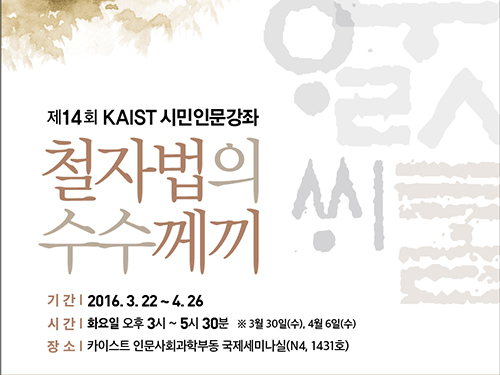 Public Lectures on the Korean Language and Alphabet
The School of Humanities and Social Sciences at KAIST will offer public lectures on the Korean language and alphabet, Hangul, from March 22, 2016 to April 26, 2016.
The lectures, which are entitled “The Riddle of Hangul,” will take place on campus in Daejeon.
A total of six lectures will be held on such topics as the origin of Korean, the grammar of ancient Korean in the Chosun Dynasty (1392-1897), and subsequent developments in contemporary Korean.
Professor Jung-Hoon Kim, who is responsible for organizing the public lecture program, said, “The audience will have an interesting opportunity to understand the history of Korean and its mechanism, while reviewing the unique spelling system of Hangul. I hope many people will show up for these wonderful classes.”
For further information and registration, please visit: http://hss.kaist.ac.kr. All lectures, available only in Korean, are free and open to the public.
2016.03.15 View 9471
Public Lectures on the Korean Language and Alphabet
The School of Humanities and Social Sciences at KAIST will offer public lectures on the Korean language and alphabet, Hangul, from March 22, 2016 to April 26, 2016.
The lectures, which are entitled “The Riddle of Hangul,” will take place on campus in Daejeon.
A total of six lectures will be held on such topics as the origin of Korean, the grammar of ancient Korean in the Chosun Dynasty (1392-1897), and subsequent developments in contemporary Korean.
Professor Jung-Hoon Kim, who is responsible for organizing the public lecture program, said, “The audience will have an interesting opportunity to understand the history of Korean and its mechanism, while reviewing the unique spelling system of Hangul. I hope many people will show up for these wonderful classes.”
For further information and registration, please visit: http://hss.kaist.ac.kr. All lectures, available only in Korean, are free and open to the public.
2016.03.15 View 9471 -
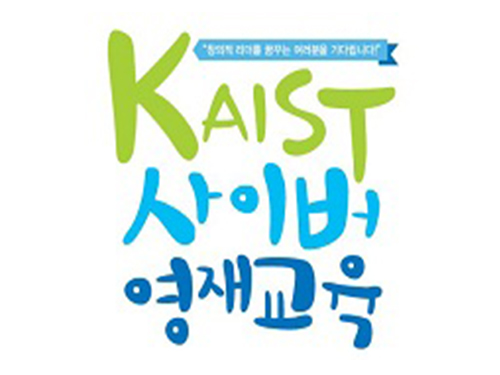 KAIST Offers Online Science Magnet High School Program
The Global Institute for Talented Education at KAIST has begun providing middle and high school students with in-depth online science education.
The institute receives applications until March 20, 2016. For details, please refer to the website: http://talented.kaist.ac.kr.
The program will run from March 21, 2016 to June 13, 2016.
Any middle and high school student can take courses on mathematics, science (physics, chemistry and biology), and information system (C language and Python computer language) based on their levels and needs. A total of 23 courses will be offered at the level of the first year of middle school to the second year of high school.
The online lecturers are drawn from science-magnet high schools nationwide. They will lead the classes to become more interactive with students, encouraging discussions and questions and answers.
KAIST students will also take part as tutors, helping the middle and high school students better understand the basic concept of the subjects they undertake and and to think creatively to solve problems.
About 500 top students will be chosen from the online course applicants to participate in a science camp hosted by KAIST during summer and winter vacations.
2016.03.14 View 5404
KAIST Offers Online Science Magnet High School Program
The Global Institute for Talented Education at KAIST has begun providing middle and high school students with in-depth online science education.
The institute receives applications until March 20, 2016. For details, please refer to the website: http://talented.kaist.ac.kr.
The program will run from March 21, 2016 to June 13, 2016.
Any middle and high school student can take courses on mathematics, science (physics, chemistry and biology), and information system (C language and Python computer language) based on their levels and needs. A total of 23 courses will be offered at the level of the first year of middle school to the second year of high school.
The online lecturers are drawn from science-magnet high schools nationwide. They will lead the classes to become more interactive with students, encouraging discussions and questions and answers.
KAIST students will also take part as tutors, helping the middle and high school students better understand the basic concept of the subjects they undertake and and to think creatively to solve problems.
About 500 top students will be chosen from the online course applicants to participate in a science camp hosted by KAIST during summer and winter vacations.
2016.03.14 View 5404 -
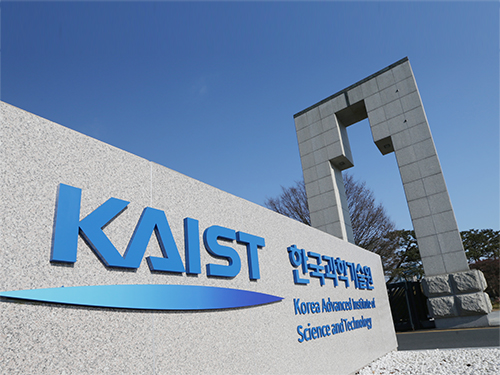 KAIST Identifies 27 Research Topics on Local Community
In tandem with the Korea Research Institute of Chemical Technology and Daejeon Civic Society Research Center, the Research Institute for Social Technology and Innovations at KAIST conducted a study on social challenges facing the local community and identified 27 research issues that could be solved with the help of science and technology.
The results of the study were released on March 10, 2016.
The research team prepared a report in an effort to encourage universities, research centers, and local citizens to cooperate in investigating social issues and finding their solutions.
The 27 issues were first chosen by pre-surveys and in-depth interviews with local citizens, and then discussed through public and expert workshops. Among the issues were environment, agriculture, energy, culture, public safety, family, and social integration. The team presented industrial complexes, agricultural facilities, and factories in rural areas were the most urgent issues of social concern within a city and province.
Hong-Gyu Lee, Director of the Research Institute for Social Technology and Innovations, said,
“The most serious problem that should be tackled in Daejon City is the chronic stench and garbage odor coming from industrial complexes, while environmental damages arisen from the development of new agricultural technology and factories are the major challenge in rural areas of Chungnam Province. This report is meaningful because citizens, universities, and research institutions worked together to find important issues related to the development of local community and explored solutions to solve those issues with the advancement of science and technology.”
2016.03.12 View 5405
KAIST Identifies 27 Research Topics on Local Community
In tandem with the Korea Research Institute of Chemical Technology and Daejeon Civic Society Research Center, the Research Institute for Social Technology and Innovations at KAIST conducted a study on social challenges facing the local community and identified 27 research issues that could be solved with the help of science and technology.
The results of the study were released on March 10, 2016.
The research team prepared a report in an effort to encourage universities, research centers, and local citizens to cooperate in investigating social issues and finding their solutions.
The 27 issues were first chosen by pre-surveys and in-depth interviews with local citizens, and then discussed through public and expert workshops. Among the issues were environment, agriculture, energy, culture, public safety, family, and social integration. The team presented industrial complexes, agricultural facilities, and factories in rural areas were the most urgent issues of social concern within a city and province.
Hong-Gyu Lee, Director of the Research Institute for Social Technology and Innovations, said,
“The most serious problem that should be tackled in Daejon City is the chronic stench and garbage odor coming from industrial complexes, while environmental damages arisen from the development of new agricultural technology and factories are the major challenge in rural areas of Chungnam Province. This report is meaningful because citizens, universities, and research institutions worked together to find important issues related to the development of local community and explored solutions to solve those issues with the advancement of science and technology.”
2016.03.12 View 5405 -
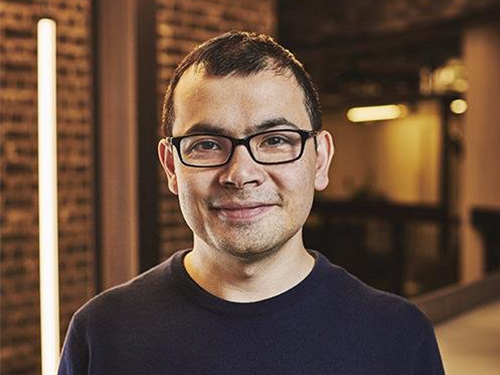 Dr. Demis Hassabis, the Developer of AlphaGo, Lectures at KAIST
AlphaGo, a computer program developed by Google DeepMind in London to play the traditional Chinese board game Go, had five matches against Se-Dol Lee, a professional Go player in Korea from March 8-15, 2016. AlphaGo won four out of the five games, a significant test result showcasing the advancement achieved in the field of general-purpose artificial intelligence (GAI), according to the company.
Dr. Demis Hassabis, the Chief Executive Officer of Google DeepMind, visited KAIST on March 11, 2016 and gave an hour-long talk to students and faculty. In the lecture, which was entitled “Artificial Intelligence and the Future,” he introduced an overview of GAI and some of its applications in Atari video games and Go.
He said that the ultimate goal of GAI was to become a useful tool to help society solve some of the biggest and most pressing problems facing humanity, from climate change to disease diagnosis.
2016.03.11 View 4949
Dr. Demis Hassabis, the Developer of AlphaGo, Lectures at KAIST
AlphaGo, a computer program developed by Google DeepMind in London to play the traditional Chinese board game Go, had five matches against Se-Dol Lee, a professional Go player in Korea from March 8-15, 2016. AlphaGo won four out of the five games, a significant test result showcasing the advancement achieved in the field of general-purpose artificial intelligence (GAI), according to the company.
Dr. Demis Hassabis, the Chief Executive Officer of Google DeepMind, visited KAIST on March 11, 2016 and gave an hour-long talk to students and faculty. In the lecture, which was entitled “Artificial Intelligence and the Future,” he introduced an overview of GAI and some of its applications in Atari video games and Go.
He said that the ultimate goal of GAI was to become a useful tool to help society solve some of the biggest and most pressing problems facing humanity, from climate change to disease diagnosis.
2016.03.11 View 4949 -
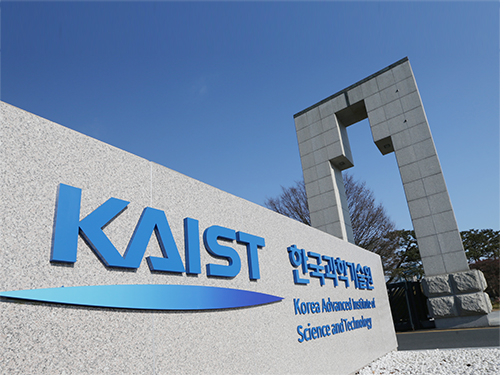 KAIST Ranks Third in the World's Top Universities for Attracting Industry Funding
The Times Higher Education released its World University Rankings online, naming the 20 best institutions that secured the largest amount of research funding from the private sector, on March 8, 2016.
The rankings were based on the 2013 record of industry-sector investments made per academic of an institution.
According to the list, KAIST ranked third with a figure of $254,700.
Germany’s Ludwig Maximilian University (Munich) took first place ($400,000), while the United State’s Duke University placed second ($290,000).
For a full list of the rankings, go to https://www.timeshighereducation.com/world-university-rankings/funding-for-innovation-ranking-2016.
2016.03.08 View 3987
KAIST Ranks Third in the World's Top Universities for Attracting Industry Funding
The Times Higher Education released its World University Rankings online, naming the 20 best institutions that secured the largest amount of research funding from the private sector, on March 8, 2016.
The rankings were based on the 2013 record of industry-sector investments made per academic of an institution.
According to the list, KAIST ranked third with a figure of $254,700.
Germany’s Ludwig Maximilian University (Munich) took first place ($400,000), while the United State’s Duke University placed second ($290,000).
For a full list of the rankings, go to https://www.timeshighereducation.com/world-university-rankings/funding-for-innovation-ranking-2016.
2016.03.08 View 3987 -
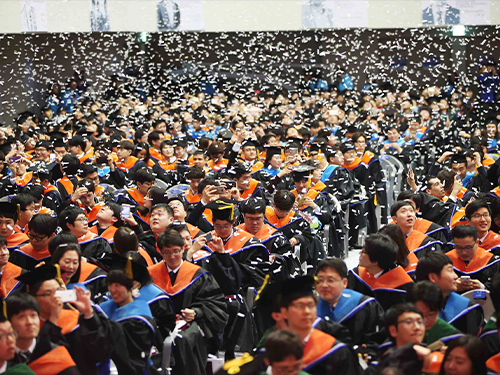 KAIST Commencement 2016
KAIST hosted its 2016 commencement ceremony on February 19, 2016 at the Sports Complex on campus.
KAIST celebrated the event with five thousand participants including graduating students, faculty, guests, Vice Minister Nam-Ki Hong of Science, ICT and Future Planning of Korea, Chairman Jang-Moo Lee of KAIST's Board of Trustees, and President Jeong-Sik Ko of the KAIST Alumni Association.
President Patrick Aebischer of the Swiss Federal Institute of Technology in Lausanne (EPFL), Switzerland, and the former Speaker of the National Assembly of Korea Chang-Hee Kang received honorary doctorates in science and technology for their contributions to the advancement of science and engineering in education and research.
KAIST granted 570 doctoral degrees, 1,329 master’s degrees, and 867 bachelor degrees on this day.
Yoon-Bum Lee of the Chemistry Department graduated with honors; Woo-Young Jin of the Mathematical Sciences Department received the Chairman’s Award of the KAIST Board and Eun-Hee Yoo of the Biological Sciences Department for the KAIST Presidential Award. Min-Hyun Cho and Yoon-Seok Chang were recipients of the President’s Award of the KAIST Alumni Association and the President’s Award of the University Supporting Association, respectively.
President Steve Kang addressed the ceremony and congratulated the graduates, saying,
“Now, your task is to make significant contributions to your communities: be leaders in your fields and remain active members of society. Given your academic knowledge and vision for the future, I encourage you to dream big.”
2016.02.23 View 42843
KAIST Commencement 2016
KAIST hosted its 2016 commencement ceremony on February 19, 2016 at the Sports Complex on campus.
KAIST celebrated the event with five thousand participants including graduating students, faculty, guests, Vice Minister Nam-Ki Hong of Science, ICT and Future Planning of Korea, Chairman Jang-Moo Lee of KAIST's Board of Trustees, and President Jeong-Sik Ko of the KAIST Alumni Association.
President Patrick Aebischer of the Swiss Federal Institute of Technology in Lausanne (EPFL), Switzerland, and the former Speaker of the National Assembly of Korea Chang-Hee Kang received honorary doctorates in science and technology for their contributions to the advancement of science and engineering in education and research.
KAIST granted 570 doctoral degrees, 1,329 master’s degrees, and 867 bachelor degrees on this day.
Yoon-Bum Lee of the Chemistry Department graduated with honors; Woo-Young Jin of the Mathematical Sciences Department received the Chairman’s Award of the KAIST Board and Eun-Hee Yoo of the Biological Sciences Department for the KAIST Presidential Award. Min-Hyun Cho and Yoon-Seok Chang were recipients of the President’s Award of the KAIST Alumni Association and the President’s Award of the University Supporting Association, respectively.
President Steve Kang addressed the ceremony and congratulated the graduates, saying,
“Now, your task is to make significant contributions to your communities: be leaders in your fields and remain active members of society. Given your academic knowledge and vision for the future, I encourage you to dream big.”
2016.02.23 View 42843 -
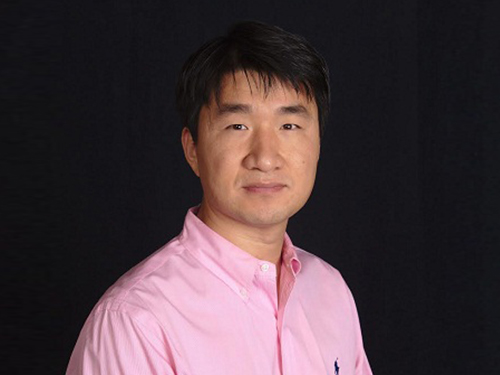 KAIST Graduate Han Receives a 2016 PECASE Award
President Barack Obama of the United States (US) announced 105 recipients of the 2016 Presidential Early Career Awards for Scientists and Engineers (PECASE) on February 18. Among the awardees was a graduate from the Department of Electrical Engineering at KAIST.
Dr. Jin-Woo Han has worked as a research scientist at the National Aeronautics and Space Administration (NASA) Ames Research Center since graduating from KAIST in 2010. This year, he is the only awardee who received a doctoral degree from a Korean university to become a recipient of the highest honor bestowed by the US government on science and engineering professionals in the early stages of their independent research careers.
The awards ceremony will take place in early spring at the White House in Washington, D.C.
Dr. Han has been involved in the development of radiation tolerant semiconductor devices as well as radiation and gas sensors under Dr. Meyya Meyyappan, Chief Scientist of the Center for Nanotechnology at NASA Ames Research Center.
KAIST and the NASA Ames Research Center made a research collaboration agreement in 2008, under which KAIST has sent 12 post-doctoral fellows to the center to date.
The PECASE awards, established in 1996 by President Bill Clinton, are coordinated by the Office of Science and Technology Policy within the Executive Office of the US President. Awardees are selected for their pursuit of innovative research at the frontiers of science and technology and their commitment to community services as demonstrated through scientific leadership, public education, or community outreach.
2016.02.23 View 10300
KAIST Graduate Han Receives a 2016 PECASE Award
President Barack Obama of the United States (US) announced 105 recipients of the 2016 Presidential Early Career Awards for Scientists and Engineers (PECASE) on February 18. Among the awardees was a graduate from the Department of Electrical Engineering at KAIST.
Dr. Jin-Woo Han has worked as a research scientist at the National Aeronautics and Space Administration (NASA) Ames Research Center since graduating from KAIST in 2010. This year, he is the only awardee who received a doctoral degree from a Korean university to become a recipient of the highest honor bestowed by the US government on science and engineering professionals in the early stages of their independent research careers.
The awards ceremony will take place in early spring at the White House in Washington, D.C.
Dr. Han has been involved in the development of radiation tolerant semiconductor devices as well as radiation and gas sensors under Dr. Meyya Meyyappan, Chief Scientist of the Center for Nanotechnology at NASA Ames Research Center.
KAIST and the NASA Ames Research Center made a research collaboration agreement in 2008, under which KAIST has sent 12 post-doctoral fellows to the center to date.
The PECASE awards, established in 1996 by President Bill Clinton, are coordinated by the Office of Science and Technology Policy within the Executive Office of the US President. Awardees are selected for their pursuit of innovative research at the frontiers of science and technology and their commitment to community services as demonstrated through scientific leadership, public education, or community outreach.
2016.02.23 View 10300 -
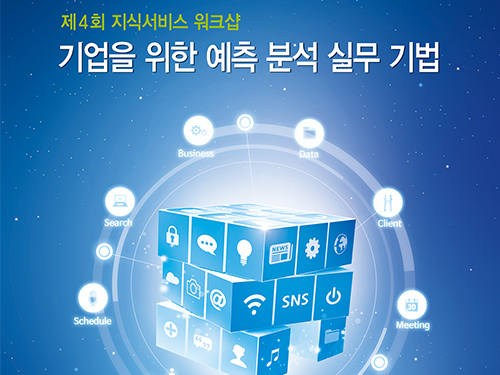 Workshop on Techniques in Prediction Analysis for the Industry
There has been growing interest in the value and the application of “big data” in recent years. To meet this interest, a workshop was held to discuss the possibility and the future of prediction analysis, which is the next big step in data mining after big data.
On February 25 in COEX, Seoul, the Department of Knowledge Service Engineering at KAIST held the 4th knowledge service workshop on “Techniques in Prediction Analysis for the Industry.”
Predication analysis is a technique that can predict the future based on the understanding of the past and the present through analyzing “big data.” If “big data” is fuel in figurative sense, the prediction analysis serves as the engine.
The Department seeks to help those companies interested in data mining by introducing fundamentals and some application examples to the executives of companies who are interested in implementation of the technique.
The lecture was delivered by six professors from the Department of Knowledge Service Engineering and the Department of Industrial and Systems Engineering at KAIST.
Thomas Miller, the author of Modeling Techniques in Predictive Analytics, covered the contents of his book at the event. Professor Moon-Yong Yi, Chair of the Department of Knowledge Service Engineering, said, “This conference will be important to companies that are considering the implementation of the prediction analysis as well as to students who are interested in the field.”
2016.02.22 View 5704
Workshop on Techniques in Prediction Analysis for the Industry
There has been growing interest in the value and the application of “big data” in recent years. To meet this interest, a workshop was held to discuss the possibility and the future of prediction analysis, which is the next big step in data mining after big data.
On February 25 in COEX, Seoul, the Department of Knowledge Service Engineering at KAIST held the 4th knowledge service workshop on “Techniques in Prediction Analysis for the Industry.”
Predication analysis is a technique that can predict the future based on the understanding of the past and the present through analyzing “big data.” If “big data” is fuel in figurative sense, the prediction analysis serves as the engine.
The Department seeks to help those companies interested in data mining by introducing fundamentals and some application examples to the executives of companies who are interested in implementation of the technique.
The lecture was delivered by six professors from the Department of Knowledge Service Engineering and the Department of Industrial and Systems Engineering at KAIST.
Thomas Miller, the author of Modeling Techniques in Predictive Analytics, covered the contents of his book at the event. Professor Moon-Yong Yi, Chair of the Department of Knowledge Service Engineering, said, “This conference will be important to companies that are considering the implementation of the prediction analysis as well as to students who are interested in the field.”
2016.02.22 View 5704 -
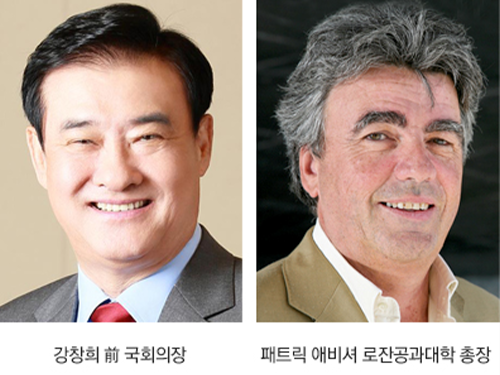 KAIST Confers Two Honorary Doctorates at Its 2016 Commencement
KAIST awarded two honorary doctoral degrees at this year’s commencement which took place on February 19, 2016.
Chang-Hee Kang (pictured on the left below), a former Speaker of the National Assembly of Korea and a serving member of the current Assembly, as well as Patrick Aebischer (pictured on the right), the President of the Federal Institute of Technology in Lausanne (EPFL), Switzerland, received honorary doctorates in science and technology.
National Assemblyman Kang was born in 1946 and grew up in Daejeon. He graduated from the Korea Military Academy in 1969, and received a master’s degree in management from Kyungnam University, Korea, in 1980.
He began his distinguished political career with his first election to the 11th National Assembly in 1983. Since then, he has been reelected to the Assembly five times, becoming a leading politician representing Daejeon and Chungchong Province for the past 35 years.
Throughout his career in public service, he served in various important offices, such as Chief Secretary for the Prime Minster of Korea, Chairman of the Telecommunications, Science and Technology Committee for the National Assembly, and the first Minister of Science and Technology of Korea.
Assemblyman Kang has always been a strong advocate for the important role that science and technology continue to play in the growth of Korea. He has worked on many of the critical issues relating to science and research in the nation, including the establishment of the Ministry of Science and Technology in the Korean government, the legislation of special law for science and technology innovation, and the adoption of Code Division Multiple Access (CDMA) for the national standard of personal communication services.
In his acceptance speech for the degree, Assemblyman Kang said, “As a member of the science and technology community, and as a part of KAIST, I will strive harder to further advance the science and technology field of Korea.”
President Patrick Aebischer was born in 1954 in Fribourg, Switzerland. He was raised in a family of artists, from which his ingenuity, a character he has often displayed as a researcher, was nurtured.
He received a doctorate in medicine from the University of Geneva in 1980, and three years later, obtained a doctorate in neuroscience from the University of Fribourg.
He started his teaching and research career at Brown University in the United States in 1984, where he was eventually promoted to Associate Professor in medical sciences. After living nearly a decade in the United States, President Aebischer returned to Switzerland and became a professor at the Lausanne University Medical School, while serving at the same time as the Director of its Surgical Research Division and Gene Therapy Center.
President Aebischer was appointed by the Swiss Federal Council to lead EPFL in 1999, one of the two most prestigious science and technology universities in the nation. From March 2000, he has served as the President of EPFL.
Under his leadership, EPFL has flourished and expanded its reach across the globe. The university’s core expertise, engineering, has successfully evolved. In addition to engineering, it now offers some of the best programs in natural and life sciences, finance, and management in the world.
His endeavors to promote “disruptive innovations” for the advancement of his own institution, as well as for the whole community of science and research, have led him to introduce many reforms and changes “to push the envelope” on behalf of higher education in science and technology.
In his acceptance speech, President Aebischer said, “I strongly believe that the future belongs to forward-looking and entrepreneurial universities, such as KAIST—to be able to offer a unique education aimed at finding solutions to the global issues such as climate change, dwindling natural resources, aging, cyber-security, and migration amongst others.”
2016.02.19 View 5525
KAIST Confers Two Honorary Doctorates at Its 2016 Commencement
KAIST awarded two honorary doctoral degrees at this year’s commencement which took place on February 19, 2016.
Chang-Hee Kang (pictured on the left below), a former Speaker of the National Assembly of Korea and a serving member of the current Assembly, as well as Patrick Aebischer (pictured on the right), the President of the Federal Institute of Technology in Lausanne (EPFL), Switzerland, received honorary doctorates in science and technology.
National Assemblyman Kang was born in 1946 and grew up in Daejeon. He graduated from the Korea Military Academy in 1969, and received a master’s degree in management from Kyungnam University, Korea, in 1980.
He began his distinguished political career with his first election to the 11th National Assembly in 1983. Since then, he has been reelected to the Assembly five times, becoming a leading politician representing Daejeon and Chungchong Province for the past 35 years.
Throughout his career in public service, he served in various important offices, such as Chief Secretary for the Prime Minster of Korea, Chairman of the Telecommunications, Science and Technology Committee for the National Assembly, and the first Minister of Science and Technology of Korea.
Assemblyman Kang has always been a strong advocate for the important role that science and technology continue to play in the growth of Korea. He has worked on many of the critical issues relating to science and research in the nation, including the establishment of the Ministry of Science and Technology in the Korean government, the legislation of special law for science and technology innovation, and the adoption of Code Division Multiple Access (CDMA) for the national standard of personal communication services.
In his acceptance speech for the degree, Assemblyman Kang said, “As a member of the science and technology community, and as a part of KAIST, I will strive harder to further advance the science and technology field of Korea.”
President Patrick Aebischer was born in 1954 in Fribourg, Switzerland. He was raised in a family of artists, from which his ingenuity, a character he has often displayed as a researcher, was nurtured.
He received a doctorate in medicine from the University of Geneva in 1980, and three years later, obtained a doctorate in neuroscience from the University of Fribourg.
He started his teaching and research career at Brown University in the United States in 1984, where he was eventually promoted to Associate Professor in medical sciences. After living nearly a decade in the United States, President Aebischer returned to Switzerland and became a professor at the Lausanne University Medical School, while serving at the same time as the Director of its Surgical Research Division and Gene Therapy Center.
President Aebischer was appointed by the Swiss Federal Council to lead EPFL in 1999, one of the two most prestigious science and technology universities in the nation. From March 2000, he has served as the President of EPFL.
Under his leadership, EPFL has flourished and expanded its reach across the globe. The university’s core expertise, engineering, has successfully evolved. In addition to engineering, it now offers some of the best programs in natural and life sciences, finance, and management in the world.
His endeavors to promote “disruptive innovations” for the advancement of his own institution, as well as for the whole community of science and research, have led him to introduce many reforms and changes “to push the envelope” on behalf of higher education in science and technology.
In his acceptance speech, President Aebischer said, “I strongly believe that the future belongs to forward-looking and entrepreneurial universities, such as KAIST—to be able to offer a unique education aimed at finding solutions to the global issues such as climate change, dwindling natural resources, aging, cyber-security, and migration amongst others.”
2016.02.19 View 5525 -
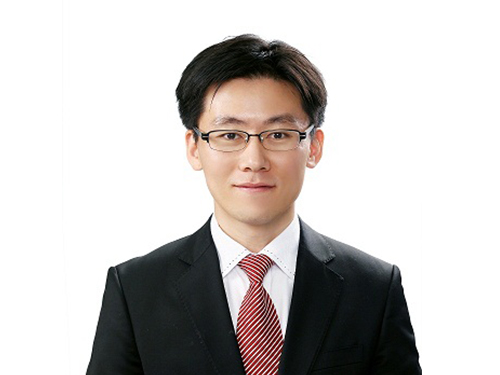 GSIS Graduates Its First Doctor
The Graduate School of Information Security at KAIST (GSIS) granted its first doctoral degree to Il-Goo Lee at the university’s 2016 commencement on February 19, 2016.
Lee received the degree for his dissertation entitled “Interference-Aware Secure Communications for Wireless LANs.”
He explained the background of his research:
“As we use wireless technology more and more in areas of the Internet of Things (IoT), unmanned vehicles, and drones, information security will become an issue of major concern. I would like to contribute to the advancement of communications technology to help minimize wireless interference between devices while ensuring their optimal performance.”
Based on his research, he developed a communications technique to increase wireless devices’ energy efficiency and the level of their security, and created a prototype to showcase that technique.
He plans to continue his research in the development of the next generation WiFi chip sets to protect the information security of IoT and wireless devices.
Since its establishment in March 2011, KAIST’s GSIS has conferred 50 master’s and one doctoral degrees.
2016.02.18 View 9870
GSIS Graduates Its First Doctor
The Graduate School of Information Security at KAIST (GSIS) granted its first doctoral degree to Il-Goo Lee at the university’s 2016 commencement on February 19, 2016.
Lee received the degree for his dissertation entitled “Interference-Aware Secure Communications for Wireless LANs.”
He explained the background of his research:
“As we use wireless technology more and more in areas of the Internet of Things (IoT), unmanned vehicles, and drones, information security will become an issue of major concern. I would like to contribute to the advancement of communications technology to help minimize wireless interference between devices while ensuring their optimal performance.”
Based on his research, he developed a communications technique to increase wireless devices’ energy efficiency and the level of their security, and created a prototype to showcase that technique.
He plans to continue his research in the development of the next generation WiFi chip sets to protect the information security of IoT and wireless devices.
Since its establishment in March 2011, KAIST’s GSIS has conferred 50 master’s and one doctoral degrees.
2016.02.18 View 9870 -
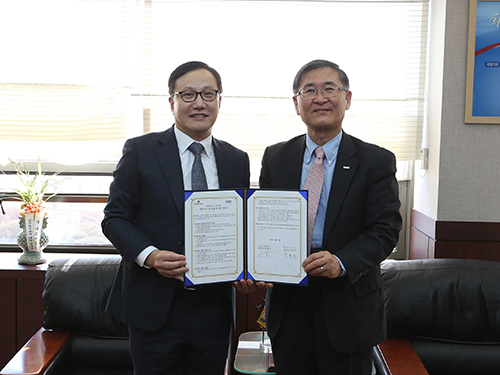 Meditox Donates 600 Million KRW Scholarship
On February 17, a Korean biopharmaceutical company Meditox, headed by Chief Executive Officer (CEO) Hyun-Ho Jeong, signed a memorandum of understanding (MOU) with KAIST to establish the “Meditox Fellowship” and donated a total of 600 million Korean won (KRW) to the university to assist in promoting more scientists in the field of biology.
Meditox CEO Hyun-Ho Jeong, KAIST President Steve Kang, Dean of Life Science and Bioengineering College Jung-Hoe Kim, and Dean of the Department of Biological Sciences Byung-Ha Oh participated in the agreement ceremony.
According to the MOU, Meditox will donate 60,000,000 KRW over a ten year period, from which KAIST can draw on to grant scholarships for master’s and doctoral students.
The “Meditox Fellowship” will support promising and enthusiastic students whose finances limit their studies. The first scholarship students for 2016 were: Kwang-Uk Min, In-suk Yeo, Sung-ryung- Lee, Si-on Lee, and Jung-hyun Kim.
Meditox CEO Jeong, who graduated from KAIST’s Department of Biological Sciences, said, "I felt it was important to start the Meditox Fellowship at my alma mater to contribute to the cultivation of outstanding scientists in the field of biological sciences."
He also said that he would plan to launch projects that aim to support not only those who receive the scholarship but also the development of Korea’s biological sciences in general.
President Steve Kang (right) and Chief Executive Officer Hyun-Ho Jeong (left) of Meditox hold the signed memorandum of understanding together.
2016.02.18 View 10873
Meditox Donates 600 Million KRW Scholarship
On February 17, a Korean biopharmaceutical company Meditox, headed by Chief Executive Officer (CEO) Hyun-Ho Jeong, signed a memorandum of understanding (MOU) with KAIST to establish the “Meditox Fellowship” and donated a total of 600 million Korean won (KRW) to the university to assist in promoting more scientists in the field of biology.
Meditox CEO Hyun-Ho Jeong, KAIST President Steve Kang, Dean of Life Science and Bioengineering College Jung-Hoe Kim, and Dean of the Department of Biological Sciences Byung-Ha Oh participated in the agreement ceremony.
According to the MOU, Meditox will donate 60,000,000 KRW over a ten year period, from which KAIST can draw on to grant scholarships for master’s and doctoral students.
The “Meditox Fellowship” will support promising and enthusiastic students whose finances limit their studies. The first scholarship students for 2016 were: Kwang-Uk Min, In-suk Yeo, Sung-ryung- Lee, Si-on Lee, and Jung-hyun Kim.
Meditox CEO Jeong, who graduated from KAIST’s Department of Biological Sciences, said, "I felt it was important to start the Meditox Fellowship at my alma mater to contribute to the cultivation of outstanding scientists in the field of biological sciences."
He also said that he would plan to launch projects that aim to support not only those who receive the scholarship but also the development of Korea’s biological sciences in general.
President Steve Kang (right) and Chief Executive Officer Hyun-Ho Jeong (left) of Meditox hold the signed memorandum of understanding together.
2016.02.18 View 10873 -
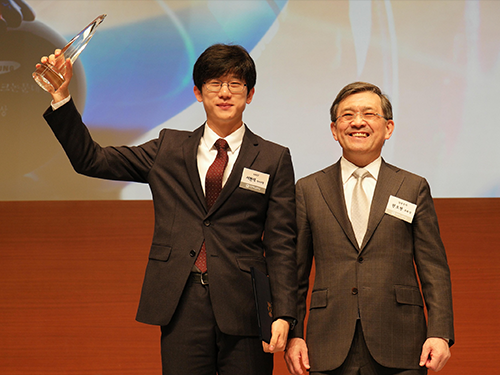 Ph.D. Candidate Seo Wins the Human Tech Paper Award
Hyun-Suk Seo, a doctoral student of KAIST’s Department of Electrical Engineering, received the grand prize of the “22nd Human Tech Paper Award” on February 3, 2016 from Samsung Electronics Co., Ltd.
Seo was the first to receive this prize ever since the Human Tech Paper Award was established 22 years ago. Until last year, the highest prize awarded for KAIST was a gold one.
The “Human Tech Paper Award” was established in 1994 by Samsung Electronics to discover and support outstanding scientists in the field of electrical engineering.
Entitled “Self-Gated Cardiac Cine MRI Using Phase Information,” Seo’s paper presented a technology that would reduce discomforts and inconveniences experienced by patients who take a magnetic resonance imaging (MRI).
This technology uses the speed changes of aorta and the abdominal movements of body to obtain the phase changes of magnetic resonance signals so that MRIs may be taken despite the organs’ movements.
Seo commented on his research, “I wanted to develop a technique that can make MRI a more comfortable experience. I will continue my research on this subject and hope to serve the needs of the society.”
In addition, the “Special Award,” which is given to schools, was awarded to KAIST. KAIST’s Department of Electrical Engineering has also been named the department that has received the second most awards (15 awards) this year.
Oh-Hyun Kwon, Vice President of Samsung Electronics, Steve Kang, President of KAIST, and Nak-In Seo, President of Seoul National University, participated in the event.
Picture: Hyun-Suk Seo (left), the recipient of the grand prize of the 2016 Human Tech Paper Award, and Oh-Hyun Kwon (right), Vice President of Samsung Electronics
2016.02.06 View 9877
Ph.D. Candidate Seo Wins the Human Tech Paper Award
Hyun-Suk Seo, a doctoral student of KAIST’s Department of Electrical Engineering, received the grand prize of the “22nd Human Tech Paper Award” on February 3, 2016 from Samsung Electronics Co., Ltd.
Seo was the first to receive this prize ever since the Human Tech Paper Award was established 22 years ago. Until last year, the highest prize awarded for KAIST was a gold one.
The “Human Tech Paper Award” was established in 1994 by Samsung Electronics to discover and support outstanding scientists in the field of electrical engineering.
Entitled “Self-Gated Cardiac Cine MRI Using Phase Information,” Seo’s paper presented a technology that would reduce discomforts and inconveniences experienced by patients who take a magnetic resonance imaging (MRI).
This technology uses the speed changes of aorta and the abdominal movements of body to obtain the phase changes of magnetic resonance signals so that MRIs may be taken despite the organs’ movements.
Seo commented on his research, “I wanted to develop a technique that can make MRI a more comfortable experience. I will continue my research on this subject and hope to serve the needs of the society.”
In addition, the “Special Award,” which is given to schools, was awarded to KAIST. KAIST’s Department of Electrical Engineering has also been named the department that has received the second most awards (15 awards) this year.
Oh-Hyun Kwon, Vice President of Samsung Electronics, Steve Kang, President of KAIST, and Nak-In Seo, President of Seoul National University, participated in the event.
Picture: Hyun-Suk Seo (left), the recipient of the grand prize of the 2016 Human Tech Paper Award, and Oh-Hyun Kwon (right), Vice President of Samsung Electronics
2016.02.06 View 9877